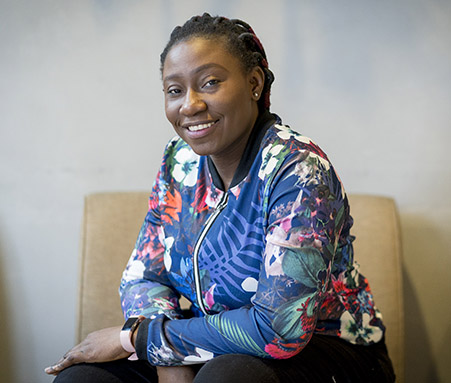)
Work-life balance for women in tech
When Tigist Beshe was growing up in Ethiopia, she would often ask how things become automated. “TVs, hospital machines — I wondered how they work,” says the software development instructor at Bow Valley College.
She also enjoyed learning, problem-solving, and asking why. For these two reasons, when she applied to university, she chose to study computer science.
She was one of a handful of girls in a program of about 75 students. “It made me feel proud that I'm going to make something which seems impossible for women,” she says.
She adds that her instructors, who were all male, would host tutorials for the female students to encourage them to contribute to the classes as much as their male peers.
After graduating, Tigist started working as a software development instructor at the same university she attended, and next, got a job as a software developer. Because she has a family with children, she found the nature of the job demanding. “The team communicated when I wasn't around, so I would miss things in projects,” she says, adding the job required evening and weekend work. “That made me feel that I wasn’t fitting into the team.”
On the website for the International Day of Women and Girls in Science, the Secretary General’s Message says that unsupportive environments can keep women and girls from pursuing careers in science, technology, engineering, and math (STEM). “We must do more to change workplace culture so that girls who dream of being scientists, engineers, and mathematicians can enjoy fulfilling careers in these fields,” says the message from António Guterres.
Rosemary Sanchez, a software development manager at Benevity, says she finds ways to make sure work doesn’t take over. “If I do need to be offline for a period of time, I make sure my team members know in advance and direct them to someone else who can support any immediate concerns,” she says.
To a female aspiring to be a software developer, she says “Be intentional about your boundaries.”
“Just because you are saying “no” to someone doesn’t mean that you’re letting them down—it can be a chance for someone else to grow and discover things for themselves.”
She adds that a female in a non-managerial role should recognize her motivation for working on something outside of office hours. Is it because she’s excited about the project or because she perceives that she’s expected to do it?
“Women who value their careers can often be overcommitted, but it’s important to establish a shared workload with the team in the office as well as the family-team at home.”
As for Tigist, she realized that she was more interested in teaching, and that education afforded her a better balance between work and family. “[As an instructor], I keep learning new technologies, new tools. Also, I have all my time for my family and my kids.”
If you’re a female thinking about a career in technology, learn more about the programs that Bow Valley College offers, like software development and IBM Skills Academy.
Posted on February 11, 2019
Story by Julie-Anne Cleyn, photos by Chris Bolin
She also enjoyed learning, problem-solving, and asking why. For these two reasons, when she applied to university, she chose to study computer science.
She was one of a handful of girls in a program of about 75 students. “It made me feel proud that I'm going to make something which seems impossible for women,” she says.
She adds that her instructors, who were all male, would host tutorials for the female students to encourage them to contribute to the classes as much as their male peers.
After graduating, Tigist started working as a software development instructor at the same university she attended, and next, got a job as a software developer. Because she has a family with children, she found the nature of the job demanding. “The team communicated when I wasn't around, so I would miss things in projects,” she says, adding the job required evening and weekend work. “That made me feel that I wasn’t fitting into the team.”
On the website for the International Day of Women and Girls in Science, the Secretary General’s Message says that unsupportive environments can keep women and girls from pursuing careers in science, technology, engineering, and math (STEM). “We must do more to change workplace culture so that girls who dream of being scientists, engineers, and mathematicians can enjoy fulfilling careers in these fields,” says the message from António Guterres.
Rosemary Sanchez, a software development manager at Benevity, says she finds ways to make sure work doesn’t take over. “If I do need to be offline for a period of time, I make sure my team members know in advance and direct them to someone else who can support any immediate concerns,” she says.
To a female aspiring to be a software developer, she says “Be intentional about your boundaries.”
“Just because you are saying “no” to someone doesn’t mean that you’re letting them down—it can be a chance for someone else to grow and discover things for themselves.”
She adds that a female in a non-managerial role should recognize her motivation for working on something outside of office hours. Is it because she’s excited about the project or because she perceives that she’s expected to do it?
“Women who value their careers can often be overcommitted, but it’s important to establish a shared workload with the team in the office as well as the family-team at home.”
As for Tigist, she realized that she was more interested in teaching, and that education afforded her a better balance between work and family. “[As an instructor], I keep learning new technologies, new tools. Also, I have all my time for my family and my kids.”
If you’re a female thinking about a career in technology, learn more about the programs that Bow Valley College offers, like software development and IBM Skills Academy.
Posted on February 11, 2019
Story by Julie-Anne Cleyn, photos by Chris Bolin




